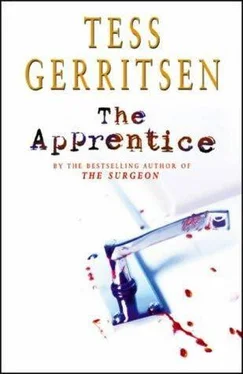“And this is due to abnormal bone formation?” said Rizzoli.
“Yes. A defect in bone metabolism.”
“What kind of illness are we talking about?”
Isles hesitated and looked at Dr. Pepe. “Her stature is short.”
“What’s the Trotter-Gleiser estimate?”
Isles took out a measuring tape, whisked it over the femur and tibia. “I’d guess about sixty-one inches. Plus or minus three.”
“So we’ve got pectus excavatum. Bilateral genu varus. Short stature.” He nodded. “It’s strongly suggestive.”
Isles looked at Rizzoli. “She had rickets as a child.”
It was almost a quaint word, rickets . For Rizzoli, it conjured up visions of barefoot children in tumbledown shacks, crying babies, and the grime of poverty. A different era, colored in sepia. Rickets was not a word that matched a woman with three gold crowns and orthodontically straightened teeth.
Gabriel Dean had also taken note of this contradiction. “I thought rickets is caused by malnutrition,” he said.
“Yes,” Isles answered. “A lack of vitamin D. Most children get an adequate supply of D from either milk or sunlight. But if the child is malnourished, and kept indoors, she’ll be deficient in the vitamin. And that affects calcium metabolism and bone development.” She paused. “I’ve actually never seen a case before.”
“Come out on a dig with me someday,” said Dr. Pepe. “I’ll show you plenty of cases from the last century. Scandinavia, northern Russia-”
“But today? In the U.S.?” asked Dean.
Pepe shook his head. “Quite unusual. Judging by the bony deformities, as well as her small stature, I would guess this individual lived in impoverished circumstances. At least through her adolescence.”
“That isn’t consistent with the dental work.”
“No. That’s why Dr. Isles said we seem to be dealing with two different individuals here.”
The child and the adult, thought Rizzoli. She remembered her own childhood in Revere, their family crammed into a hot little rental house, a place so small that for her to enjoy any privacy she had to crawl into her secret space beneath the front porch. She remembered the brief period after her father was laid off, the frightened whispers in her parents’ bedroom, the suppers of canned corn and Potato Buds. The bad times had not lasted; within a year, her father was back at work and meat was once again on the table. But a brush with poverty leaves its mark, on the mind if not the body, and the three Rizzoli siblings had all chosen careers with steady, if not spectacular, incomes-Jane in law enforcement, Frankie in the Marines, and Mikey in the U.S. Postal Service, all of them striving to escape the insecurity of childhood.
She looked at the skeleton on the table and said, “Rags to riches. It does happen.”
“Like something out of Dickens,” said Dean.
“Oh yeah,” said Korsak. “That Tiny Tim kid.”
Dr. Isles nodded. “Tiny Tim suffered from rickets.”
“And then he lived happily ever after, ‘cause old Scrooge probably left him a ton of money,” said Korsak.
But you didn’t live happily ever after , thought Rizzoli, gazing at the remains. No longer were these just a sad collection of bones, but a woman whose life was now beginning to take shape in Rizzoli’s mind. She saw a child with crooked legs and a hollow chest, growing stunted in the mean soil of poverty. Saw that child passing into adolescence, wearing blouses with mismatched buttons, the fabric worn to frayed transparency. Even then, was there something different, something special about this girl? A look of determination in her eyes, an upward tilt to the jaw that announced she was destined for a better life than the one into which she’d been born?
Because the woman she grew into lived in a different world, where money bought straight teeth and gold crowns. Good luck or hard work or perhaps the attention of the right man had lifted her to far more comfortable circumstances. But the poverty of her childhood was still carved in her bones, in the bowing of her legs, and in the trough in her chest.
There was evidence of pain as well, a catastrophic event that had shattered her left leg and spine, leaving her with two fused vertebrae and a steel rod permanently embedded in her thighbone.
“Judging by her extensive dental work, and by her probable socioeconomic status, this is a woman whose absence would be noted,” said Dr. Isles. “She’s been dead at least two months. Chances are, she’s in the NCIC database.”
“Yeah, her and about a hundred thousand others,” said Korsak.
The FBI’s National Crime Information Center maintained a missing persons file, which could be crosschecked against unidentified remains to produce a list of possible matches.
“We have nothing local?” asked Pepe. “No open missing persons cases that might be a match?”
Rizzoli shook her head. “Not in the state of Massachusetts.”
Exhausted as she was that night, she could not sleep. She got out of bed once to recheck the locks on her door and the latch on the window leading to the fire escape. Then, an hour later, she heard a noise and imagined Warren Hoyt walking up the hallway toward her bedroom, a scalpel in his hand. She grabbed her weapon from the nightstand and dropped to a crouch in the darkness. Drenched in sweat, she waited, gun poised, for the shadow to materialize in her doorway.
She saw nothing, heard nothing, except the drumming of her own heart and the throb of music from a car passing on the street below.
At last she eased into the hallway and switched on the lights.
No intruder.
She moved into the living room, flipped on another light. In one quick glance she saw the door chain was in place, the fire escape window latched tight. She stood gazing at a room that was exactly as she’d left it and thought: I’m losing my mind.
She sank onto the couch, put down her gun, and dropped her head in her hands, wishing she could squeeze all thoughts of Warren Hoyt from her brain. But he was always there, like a tumor that could not be excised, metastasizing into every waking moment of her life. In bed, she had not been thinking of Gail Yeager or the unnamed woman whose bones she had just examined. Nor had she been thinking of Airplane Man, whose file remained on her desk at work, staring at her in silent reproach for her neglect. So many names and reports demanded her attention, but when she lay down at night and stared into the darkness, only Warren Hoyt’s face came to mind.
The phone rang. She snapped straight, her heart battering against her chest. It took her a few breaths to calm down enough to pick up the receiver.
“Rizzoli?” said Thomas Moore. It was not a voice she’d expected to hear, and she was caught off guard by a sudden sense of longing. Only a year ago, she and Moore had worked together as partners during the Surgeon investigation. Though their relationship had never gone beyond that of two colleagues, they had trusted each other with their lives, and in some ways that was a level of intimacy as deep as any marriage could be. Hearing his voice now reminded her how much she missed him. And how much his marriage to Catherine still stung her.
“Hey, Moore,” she said, her casual reply revealing none of these emotions. “What time is it over there?”
“It’s nearly five. I’m sorry for calling you at this hour. I didn’t want Catherine to hear this.”
“It’s okay. I’m still awake.”
A pause. “You’re having trouble sleeping, too.” Not a question but a statement. He knew the same ghost was haunting them both.
“Marquette called you?” she said.
“Yes. I was hoping that by now-”
“There’s nothing. It’s been nearly twenty-four hours, and there hasn’t been a single goddamn sighting.”
Читать дальше












